- Home
- Michael D. Britton
DARK: A Creepy Collection Page 10
DARK: A Creepy Collection Read online
Page 10
As Sterling fought and cried to no avail, I felt a pointy-toed boot kick me in the ribs as I rolled over onto my back.
The pain was so intense!
“I’ve been following you,” Marcia continued. “You’ve been going to all the old places I used to go with him. Looking for clues, are we? Well you can forget it! The money is mine!” She followed up her callous scream with a mumble: “Just as soon as I can figure out how to get my hands on it.”
Marcia then went for the death blow: a rock to my head.
I vibed her wandering off, breathing heavily from her exertion.
Leaving me for dead.
#
“I’m here, my love,” said Sterling.
He was kneeling over me in the grass.
“Thank you, Sterling. Thank you for trying to protect me,” I whispered.
“But I failed, Brooke,” he said.
I felt his tears splash onto my cheek.
What is happening to me?
“Sterling.”
“Yes.”
“I’m – I’m dying.”
“No, Brooke, you’re not.”
Suddenly, I realized he was holding me in his arms.
I felt the light strike my eyes.
My eyes.
The pain was gone.
I looked around.
This was a new experience – actual vision.
And I saw his face.
And I reached out and touched him.
THE END
* * * * *
Surge
The crack of a rifle split the cold stillness of a misty October dawn.
Hunters.
Or, perhaps not.
As more and more shots rang out across the valley, it became clear whoever it was out there was not shooting at a deer – unless it was a deer the size of an elephant.
Vern Charles opened the gray wooden door of his cabin and stepped out onto the porch, facing east toward the sunrise. He wore a pair of old blue jeans over his long johns, a thick gray wool jacket over his dirty t-shirt, and carried a steaming cup of cocoa. He peered across the dew-covered field that stretched out and down toward the dark forest about a half mile away.
The sun, a blurry bright spot desperately trying to cut through the thick haze, had just topped the tree line above Hollow Ridge.
Shots continued to crack and pop, coming from somewhere in the thick of the woods.
Then a man appeared, running out from between the trees, rifle in hand. He looked back over his shoulder as two more men piled out, followed closely by a fourth.
Vern placed his mug on the rotting rail of the porch and picked up a green pair of binoculars out of the lone chaise that sat facing the action. He raised them to his eyes, bringing the men into focus.
They wore faces of terror.
The group of men continued to sprint toward the cabin, stumbling as they crossed the field that was marshy in places, constantly looking back at the forest with dread.
As the men got about halfway to Vern, their pursuers slowly emerged from the forest.
Zombies.
“Dang!” Vern spat. “Not again.”
He quickly moved into high gear, knocking over his cocoa as he rushed into the cabin to gather his weapons.
It had been nearly six months since the last surge. Since then, he’d had several opportunities to make trades of supplies and stock up on what he hoped he would never need again: hollow-point shells.
Back in the Days Before, prior to the Great Collapse, Vern figured he’d be toast in the New Economy, as he didn’t have any marketable skills like “mechanic” or “plumber” or “farmer.” He didn’t know how to fix wagon wheels, design crude irrigation systems, or raise crops. And he wasn’t much of a horseman.
Sure, he could do manual labor, but his capacity was limited by his bad leg that caused him to noticeably limp on the right side.
Then he discovered, much to his delight, that the one skill he did have actually had a market in this new retro-world.
Stories.
This last case of hollow points had been a good trade for a four-thousand word short story he’d written in the margins of an old newspaper. Something about time-traveling aliens, or some such. Not one of his best, by any means. But a case of hard-to-come-by hollow-points for an afternoon’s work was a good deal.
He loaded his weapon, then limped to the window to see four men approaching the cabin, now only about a hundred yards out. He reached for his .22 handgun, sitting on the book shelf, and carried it outside with his rifle.
He fired the pistol into the air once.
“Stop where you are!” he called out. “You’re welcome to hole up here and fight the zombies, but before you get any closer, I need to know that none of you is infected with the Undeath!”
“We’re not!” yelled the nearest man, a heavy-set fellow in his late forties. “They never touched us! They got two of our guys, but never touched the four of us!”
A man’s word was worth more than it used to be.
You’d think that in a lawless world, people would be more apt to lie, steal and plunder. But as it turned out, with the law solely in the hands of edgy, gun-wielding citizens, people tended to choose honesty over a bullet to the head.
“Come on, then!” yelled Vern. “Hurry up – I need time to set up the perimeter.”
The cabin was built against a steep rocky outcropping at the foot of the mountains – a defensible position that had only one way in or out – east.
As the four men scrambled over the low wooden fence surrounding the cabin, Vern got to work on activating his security measures: a number of spring-loaded “booby trap” devices placed about twenty yards out.
It was a pretty ingenious system: each trap was designed to rapidly whip out a scythe at approximate head level, then would retract to its original pre-sprung position from the kinetic energy of the other traps – essentially resetting themselves automatically. The system had cost Vern twenty short stories and a young adult novel.
Once the four strangers were inside the perimeter, Vern clicked the first trap into place, which in turn set all the other traps. Decapitation, by blade or by bullet – or incineration - was the only “cure” for the Undeath.
Vern then looked toward the forest, peering through the binoculars, to see the zombies had only gained about three hundred yards of ground. Already slow-moving in their tattered rags with their damaged, rotting bodies, they were hindered even further by the rough, soggy land they were trying to traverse.
“Looks like we’ve got about a half hour before they’re upon us,” Vern said.
He’d dealt with these types before.
The first time, three years ago, they’d taken his wife and his little boy.
The loss had just about killed Vern.
While grieving, he had written some of his finest work. He hated the stories, though, for they’d come at too high a price.
He had to get rid of them, get them out of the house. But in this world of want, he could let nothing go to waste. So he sold them.
They were, ironically, his first story sales ever.
In the Days Before, Vern had been trying (diligently, but unsuccessfully) to sell his short stories and novels to New York publishers for several years. His wife, Elena, had been a wonderful supporter of his career goal to be a big-time fiction author. While he worked as a marketing writer for a technology company, he dreamed of the day that he could quit the day job and work from home, surrounded by his family, writing award-winning tales to ignite the imaginations of science fiction, fantasy, mystery and thriller readers the world over.
It never panned out.
But he never stopped writing. And when the solar plasma bomb hit, and the world’s electronics were shut down forever, he had thought, at first, that his dreams were over.
Then, when he sold those first stories after Elena and Liam were gone, he realized first-hand an economic reality: the
law of supply and demand.
He’d lived his life in a world that valued things one day, but discovered them worthless the next. In a world with no electricity and no electronics, things like DVDs, CDs, iPods, computers, and TVs all became of no use in the post-electronic world of the New Economy.
What did have value? Food, clothing, practical skills.
And books. Thankfully, Vern had been hoarding books for years.
Books filled the void created by the lack of mass-communication information exchange and entertainment to some degree. Written stories replaced film (the way film had originally displaced the written word). Local live performances of music and plays became more popular once again, too.
Being a writer suddenly wasn't such a bad thing after all, since entertainment options were diminished.
With no more publishing houses, Vern no longer had a hope for the mass-production or distribution of his work, but at least he could produce it (and was no longer dependent on the acceptance of a publisher to produce or distribute his work).
Since there was a scarcity of new reading material due to the elimination of production and distribution, his work went up in value. So, Vern sold handwritten copies of his stories. They retained their value pretty well and could be resold after reading.
He became known as “the local writer,” a small taste of fame that dimmed after a while as his wares became as mundane to him as trading eggs for water, or wrench-turning for chickens.
He was doing what he loved, “living the dream” of writing fiction from home for a living.
But the dream was bittersweet – mostly bitter – as his desire to work from home had been fueled by a love for his now-dead family.
The dream was subjugated to this nightmare the world now knew.
“I’m Jack,” said the heavy-set man, “this is Keith, Sean, and Larry,” he finished, pointing to each of the other men.
Vern shook each of their hands in turn. “Vern. Vern Charles.”
“The writer?” asked Keith.
“Yeah.”
Keith had a bookwormish look to him – mid-thirties, slender, black-haired, a pair of repaired eyeglasses perched on his narrow nose.
Sean and Larry must have been about nineteen – strong, tough boys who’d have only been about eight years old when the plasma bomb had changed everything. For them, this world was normal, the Days Before a vague childhood memory.
Liam would’ve been eight this year. Vern pushed the thought from his mind. “Well, guys, let’s take inventory.”
They knew exactly what Vern meant, and started emptying their coat pockets on the solid oak dining table.
After a few minutes taking stock, Vern said, “Well, this is not bad, and I’ve got a few boxes of ammo in the back, too. But the question is, how many of them are there?”
“We saw about forty of ‘em in the woods,” said Jack.
Vern stepped to the window and pulled back an off-white curtain. The surge of zombies was now a little more than half way to the cabin. No more were emerging from the forest. “Looks about right – maybe a few more.”
After the plasma bomb – a natural solar phenomenon – had wiped out the world’s modernity, another thing happened: people started getting sick.
Very sick.
Without the resources previously available, doctors and scientific researchers could not keep up with the mutating viruses. Some thought the plasma bomb may have even created some of the new strains somehow – but there was no way to be sure of anything anymore.
Except that something horrible was happening to people.
Those infected with the Undeath turned into zombies in a matter of days – sometimes as fast as a few hours. It was only transmitted by touch, thankfully. If it ever were to go airborne, the human race would have mere weeks before they all became relentless, mindless, brain-eating zombies.
“Let’s load up,” said Vern. “I think we can take this surge down.” He started to remove the hollow-point shells from the boxes, one at a time. “Let the perimeter defenses take out as many as possible before firing any shots. You don’t need me to remind you that we need to conserve ammo.”
The four others nodded while they loaded. The boys kept quiet, but Keith said, “You sound like you’ve run into them before.”
Vern finished loading and stepped to a drawer in the kitchen, pulled out a half-dozen long kitchen knives. “I have. A handful of times.” He didn’t go into details – they were too painful to discuss with strangers. “Here, take one each,” he said, handing out the blades. “In case things turn south.”
“Fighting zombies hand-to-hand is a dangerous proposition,” said Jack, taking a knife and slipping it into his belt. “One touch and you’re history.”
“Yes,” said Vern, “but if our guns fail us, and you can find any way to slice one of their heads off without getting touched, then a knife may be the only thing between you and life as one of the undead.”
Sean and Larry were peeking out the window, keeping an eye on the slow, dreadful approach of the surge. “They’re getting close,” said one of the boys. “About thirty yards from the perimeter.”
“Take up positions,” said Vern. “And remember – not a shot until they’re inside the trap line.”
The five men found places near the windows facing east, but soon had to move to each side of the cabin as the zombies reached the perimeter and began to swarm around, encircling the property.
The pale, slimy beings – formerly human, as Vern somberly considered – began to be sliced and diced by the security devices. Heads departed shoulders as the fully-dead dropped to the ground, only to be mindlessly trampled by the next wave of intruders.
Before long, a handful of zombies managed to clamber over the stacked fallen to avoid the traps and move in toward the cabin.
“Fire at will,” Vern called out to the others in the cabin.
A barrage of exploding bullets took the heads off several zombies.
Two made it as far as the porch, where Vern blew their heads off at near-point-blank range.
Then silence.
“We did it!” Larry cheered.
Then Vern’s face dropped into a horrified scowl as he looked beyond Larry’s shoulder.
Emerging from the forest was a surge unlike anything Vern had ever witnessed.
“Oh . . . my . . . there must be two hundred of ‘em,” was all he could muster as the swarm of bodies stumbled out of the trees like so many drunken vagrants.
Everyone turned to look, and Larry let out a little yelp.
“What are we gonna do?” asked Sean.
“We fight,” said Vern.
“We don’t have enough ammo,” said Jack.
“The perimeter will hold off some, the rest – we just have to make sure every shot counts.”
The men sat and waited for the surge to arrive – it was all they could do. There were no other defensible positions in the area, they were far from any other living people, and given the shape of the terrain, the only way to get away would be through the oncoming horde.
After close to forty five minutes of tension, the first zombies arrived at the perimeter.
Heads started flying.
But it wasn’t long before enough bodies amassed for the undead to begin climbing over the security line, as their predecessors had done barely an hour before.
Once again, the men steeled themselves and began firing. It was a gory melee as dozens of zombies infiltrated the immediate area, only to have their heads blasted off by the powerful weaponry.
But the sheer numbers proved to be too much for the small band of would-be survivors. Several zombies made it up the porch steps and began throwing themselves clumsily against the doors and windows, smashing through the glass with their grasping claws.
Several point-blank shots did away with them, but they were soon replaced by the next wave of creatures.
“I’m out of ammo!” screamed L
arry. Vern tossed him his .22 handgun, but Larry quickly emptied it trying to take off the head of just one zombie. He then pulled out his knife and crouched in a corner of the kitchen.
Several minutes later, six zombies overwhelmed the cabin door and came after the men, whose ammo was now all spent.
Vern’s visitors all swiped at the zombies with their knives, cautious to not touch their attackers, yet eager to inflict damage.
Within moments, the men were cornered and quickly succumbed to the crowd of zombies and their appetite for fresh brains.
Meanwhile, Vern, seeing his situation was hopeless, retreated to his bedroom and barred the door against the zombies and the muffled screams of the men in the kitchen.
He grabbed a story he had written about his family. This was the one joyful tale he’d written after the passing of his beloved wife and son – the one that helped him begin to heal – and the only one from that period that he had kept instead of selling.
Vern sat on his bed and began to read the story aloud to comfort himself as he prepared to die. It told of a happy young family and an adventure at the beach. Vern immediately began to cry as he read it, but he kept reading it, louder and louder as the bumping and scraping and gnashing at his door grew in intensity.
As he got into the rhythm of the story, he started to notice that the attempts to gain access to his room were decreasing. Finally, they stopped.
Curious, he kept reading aloud, but carefully unbarred the door and peeked out.
The zombies were still there – some of them with fresh brains on their lips – but they were just standing, stopped in their tracks.
They seemed to be listening.
Enthralled.
Some of them began to sit down as Vern continued to read the story. The cabin was quiet except for a few muffled gurgles.
As he approached the end of the story, he started to fear they would resume their attack.
He was right.
He quickly grabbed a book off the shelf as they moved toward him, and began reading. It was something by Asimov.
It didn’t stop them.
He reached for his stack of handwritten manuscripts and started to read one of his own stories again.
That did the trick.
The zombies stopped again and went back to their non-aggressive, entranced state.
It was a stand-off: as long as Vern kept reading them his own stories, the zombie onslaught was abated.

 Turn the Page
Turn the Page Checkmate
Checkmate A Slave to Race
A Slave to Race The Only
The Only Convergence
Convergence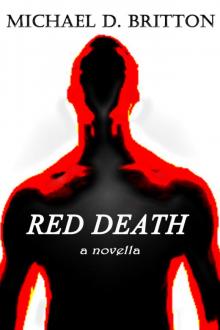 Red Death
Red Death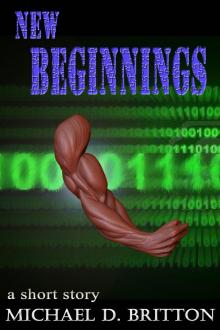 New Beginnings
New Beginnings Liberation
Liberation Old Wounds
Old Wounds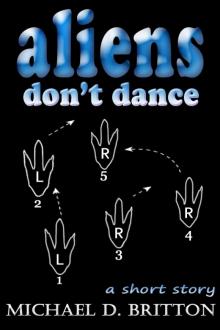 Aliens Don't Dance
Aliens Don't Dance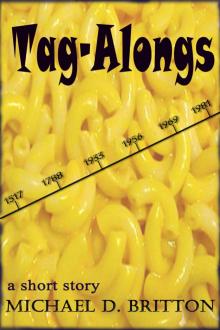 Tag-Alongs
Tag-Alongs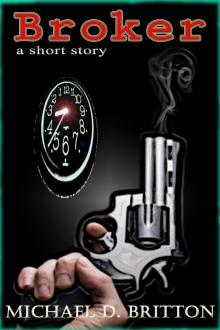 Broker
Broker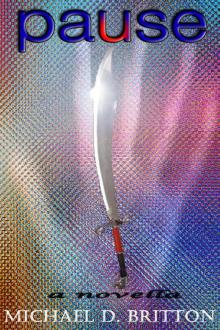 Pause
Pause Predict THIS
Predict THIS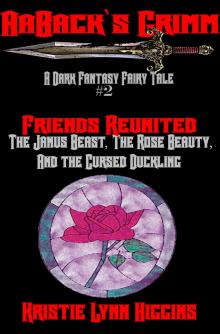 AaBack's Grimm: Dark Fantasy Fairy Tale #2 Friends Reunited: The Janus Beast, The Rose Beauty, And The Cursed Duckling
AaBack's Grimm: Dark Fantasy Fairy Tale #2 Friends Reunited: The Janus Beast, The Rose Beauty, And The Cursed Duckling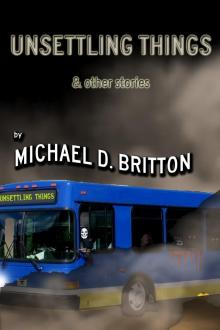 Unsettling Things & Other Stories
Unsettling Things & Other Stories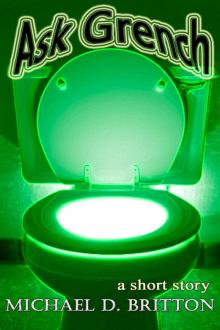 Ask Grench
Ask Grench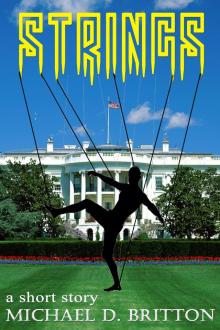 Strings
Strings Going to the Dogs
Going to the Dogs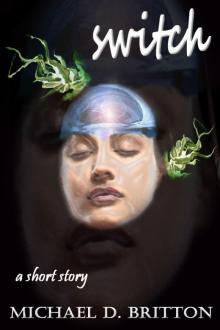 Switch
Switch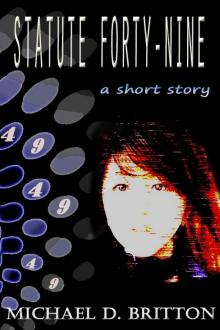 Statute Forty-Nine
Statute Forty-Nine Brain Storm
Brain Storm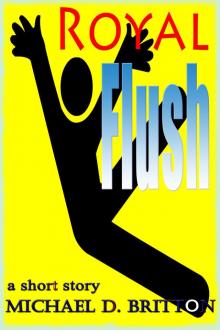 Royal Flush
Royal Flush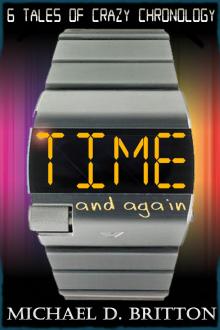 Time and Again: A Collection of Crazy Chronology
Time and Again: A Collection of Crazy Chronology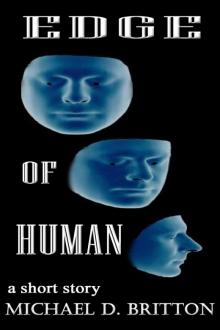 Edge of Human
Edge of Human A Sense of Souls
A Sense of Souls Decisions, Decisions
Decisions, Decisions Dream Soldiers
Dream Soldiers Spies: 7 Short Stories
Spies: 7 Short Stories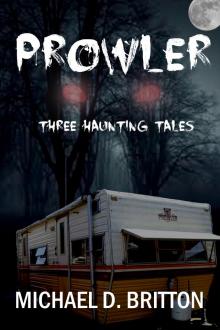 Prowler: Three Haunting Tales
Prowler: Three Haunting Tales The Release
The Release Lunar Tales - an anthology
Lunar Tales - an anthology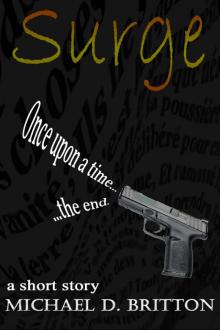 Surge
Surge Sole Survivarrrgh
Sole Survivarrrgh Remember
Remember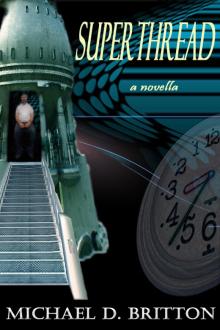 Superthread
Superthread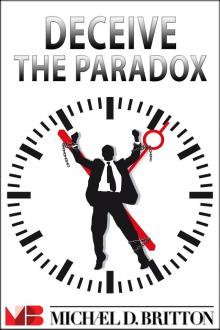 Deceive the Paradox
Deceive the Paradox Project: Dreamer
Project: Dreamer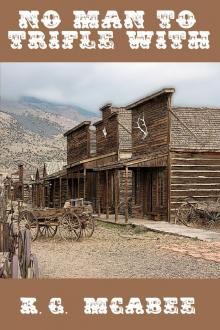 No Man to Trifle With
No Man to Trifle With Diaspora
Diaspora Quartet for Three
Quartet for Three The File
The File These Dark Electrons
These Dark Electrons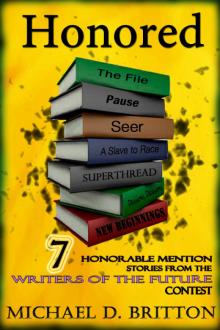 Honored: 7 Honorable Mention Stories from the Writers of the Future Contest
Honored: 7 Honorable Mention Stories from the Writers of the Future Contest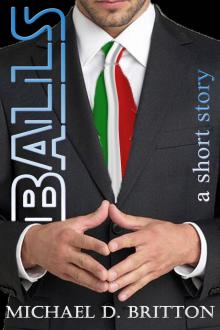 Balls
Balls The Final Testament
The Final Testament The Exile
The Exile OtherPlace
OtherPlace